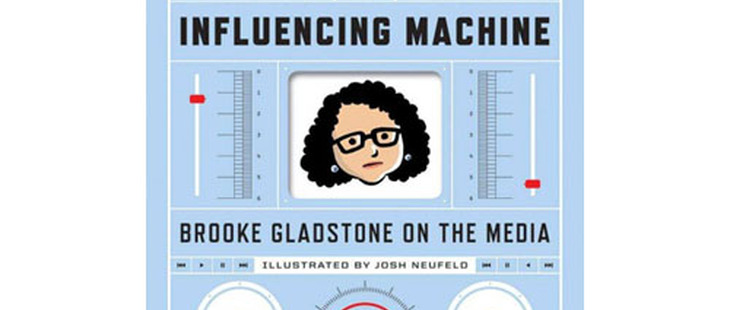
Media maven Brooke Gladstone was in town last week to read at the IFOA, and she was quoting commies.
“Remember that too often quoted remark by Italian Antonio Gramsci?” the host of the US radio show and podcast On the Media, asked me while sitting in the hospitality suite on the top floor of the Westin Harbour Castle. I did not remember there being any remark by this inter-war Marxist that had been quoted to me at all, never mind too often. She forgave me my embarrassing lack of Marxist bona fides and continued. “The old world is dead,” she quoted, “the new world is yet to be born, and in the interregnum there is much morbidity.”
We were talking about media, and about her book about media, The Influencing Machine, a fun and informative piece of illustrated non-fiction she composed with artist Josh Neufeld. The dying old world she’s referring to is what we’ve come to know as traditional media. But she’s careful to point out that traditional media is something that started with the penny press sometime in the 19th century, and crystallized with the introduction of television.
“Television is the aberration that completely reversed the pattern of cheaper and cheaper media,” she says. “The style of journalism is in many ways the product of the technology and business models that have to support it and the political culture, and the one that presided over the second half of the last century was mass culture and mass politics.”
Her new world is one where coalitions of local and international online organizations band together and use centralized resources to do the kind of research and data collection and analysis that previously required huge, advertising-backed conglomerates like the Globe and Mail and the New York Times to achieve.
But we’re living in that messy, morbid interregnum, where nobody knows quite what to do, and those who think they do worry they might not be able to survive long enough to be proven right.
“I just think we have to hang on through the morbidity,” she says, her feet tucked under her in a not entirely balanced easy chair version of the lotus position. “I see new structures already emerging, we are in the midst of a big, big change; it’s so obvious it’s pathetic to even say. We have to form new business models, modulate the ones that are already there; we need to acknowledge the role of the news consumer in the creation of news now, and acknowledge that there is a changing syntax, and that the precepts and principles that dominated during the time of television and mass media are beginning to disintegrate and fall back to the precepts and principles that guided journalism back when it was not a mass medium, back when you didn’t need to amass audiences at unprecedented size in order to remain solvent.”
That is, back before—to use her book’s most powerful image—The Great Refusal. It’s a term she takes from Yeats, who took it from Dante, who used it to describe the masses of grey souls who had earned neither heaven nor hell, but through their decision to commit to nothing, neither good nor evil, were relegated to purgatory. Yeats used it to describe journalists. “I hate journalists,” he wrote in an early letter to Katherine Tynan. “There is nothing in them but tittering, jeering emptiness… they have ceased to be self-centred, have given up their individuality.” In our chat, Gladstone refers to the journalists who fully buy in to the notion of their own objectivity—in a world that demands anything but—as “passionless priests.”
“Few reporters proclaim their convictions,” she writes in a page of her book that depicts her joining a herd of cowardly journalists in a purgatorial jet stream headed straight to no place. “Fewer still act on them to serve what they believe to be the greater good. Even now, arguably another time of profound moral crisis, most reporters make The Great Refusal.”
The downsides of non-objective journalism are obvious, and she mentions Anderson Cooper losing it in New Orleans as an informative example. When he got upset, and was joined by others reporting on what turned out to be non-existent death and rape in the stadium and convention centre while Bush twiddled, Pew Research found that the public estimation of the press rose sharply, “despite the fact,” she says, “that the coverage was pretty bad.” So bad, in fact, that people’s vision of what happened in New Orleans in the aftermath to Katrina is still tinged with high-profile reports of things that never happened. “What we really want from the media,” she says, “is not necessarily first accuracy and immediacy and objectivity, what we really want is a reflection of our principles, our values, our priorities.” And our prejudices. As New Orleans Times-Picayune editor Jim Amoss pointed out later to the Los Angeles Times, “If the Dome and Convention Center had harbored large numbers of middle-class white people, it would not have been as fertile ground for this kind of rumor-mongering.”
But the upsides are all around us. Gladstone mentioned an NPR staffer, Andy Carvin, as a prime example (Gladstone’s show is distributed by NPR). “Somehow, willy nilly, he became engaged, actively engaged, in tweeting about the Green Revolution,” she says, “particularly what was going on in Egypt. And eventually, a lot of tweets were gong through him. He became a repository and vetter of tweets. When we were in Egypt not long after Mubarak fell, there was a rumour that my producer had been kidnapped by the government and it was all over the place, and then Andy Carvin goes, ‘We know that this is not true,’ and that rumour was dead.”
As she points out, Carvin was clearly sympathetic to the revolution—he didn’t bother giving equal time to government statements.
Objective journalism isn’t going anywhere soon. The online incarnations of the traditional media will continue to abide by it for the foreseeable future. Which, in this particular interregnum, can get confusing. And just as the perverse notion that objectivity can be achieved by what Gladstone describes as giving “mathematically precisely equal time to unequal positions,” can result in horrific journalism, so can advocates writing from the cheap seats, especially before the new media regime shakes out and standards are up for grabs. “Like anything else in this caveat emptor world,’ she says, “you don’t get it served to you on a silver platter anymore, but you get a much wider array.”
Gladstone recommends collecting a few “curators,” like Carvin (@acarvin), in areas that interest you, and have them filter the best of the stuff that’s out there onto your screen, something that requires as much expertise, and credibility, as any journalist has ever achieved. She also recommends engaging in a little of what she calls “serendipity hunting” on sites like aldaily.com that delight in throwing unexpected stuff at you.
“The problem,” she says, “is that the media, which has always been a plural noun in grammar, is now truly plural in fact.” It also handily happens to be the solution.
__
Bert Archer is the Toronto Standard Media Critic.















